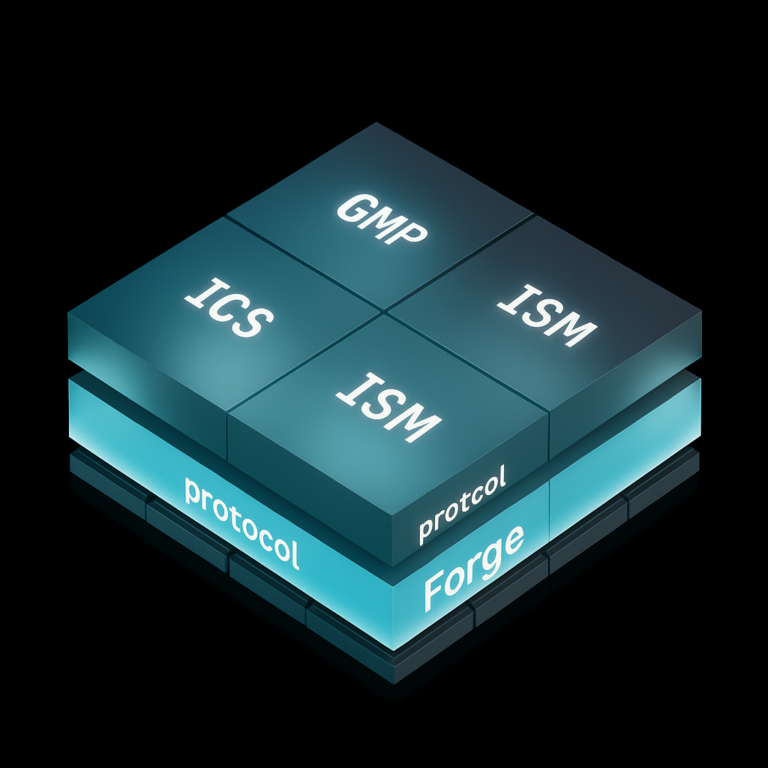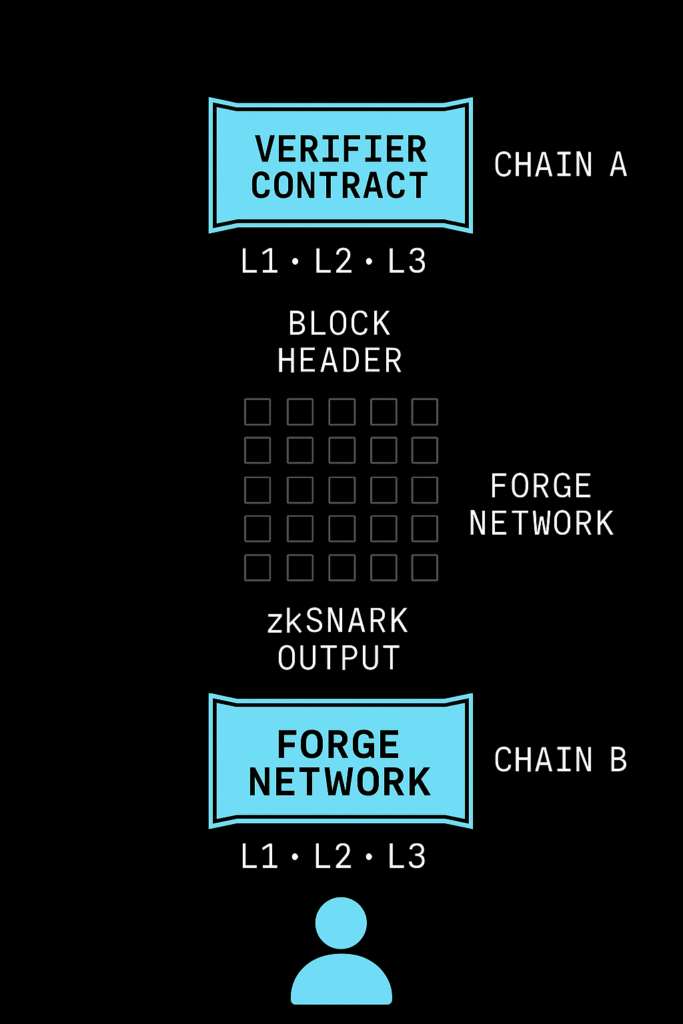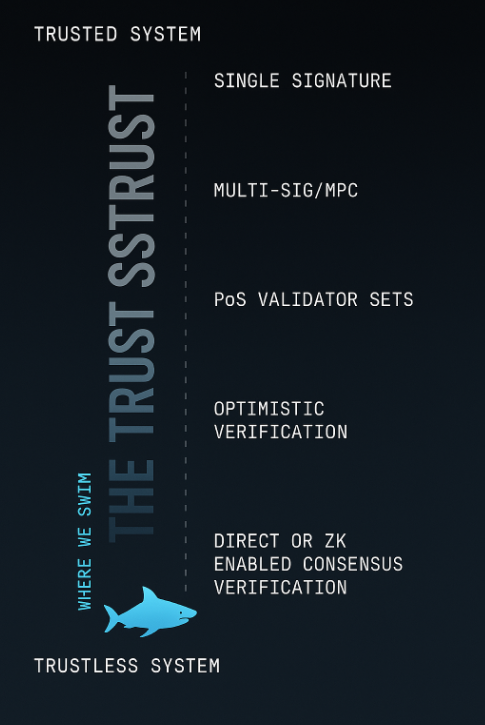bUILD YOUR PATH
Study Forge.
What is Forge?
Forge is a modular interoperability protocol purpose-built for the Solana ecosystem. It enables fast, secure, and trustless exchange of assets and messages across Solana programs, runtimes, and execution environments.
Forge is powered by two core innovations. First is consensus verification, where Solana validators sign off on program state, and other environments can cryptographically verify that consensus was reached — all without relying on bridges or off-chain actors.
Second is zero-knowledge cryptography, which allows this verification to happen efficiently — minimizing compute and on-chain costs while preserving speed and security.
Together, these systems unlock seamless, low-cost interoperability across Solana-based applications — with no trusted parties, no wrapped tokens, and no compromises.
What is Interoperability?
Interoperability within Solana means enabling seamless communication between programs, runtimes, and execution layers — without fragmentation.
Forge gives developers the ability to build across any Solana-native environment, whether it’s traditional programs, custom runtimes, or emerging execution layers. With built-in support for zk-based messaging and consensus verification, Forge eliminates UX bottlenecks caused by isolated systems.
The result: a unified Solana experience where users and applications can move, coordinate, and settle — instantly and trustlessly.

What is Modularity?
Modularity in Solana refers to building systems from self-contained, composable components that can be upgraded or swapped independently. This approach boosts flexibility, scalability, and developer velocity — allowing teams to ship faster without touching the entire stack.
Forge brings modularity to the heart of Solana’s infrastructure, unlocking permissionless, zk-powered interoperability across programs and runtimes:
Prove: Zero-knowledge proofs are at the core of Forge. Catalyst, Forge’s proving system, generates cryptographic proofs of validator consensus and state transitions — enabling secure, trustless messaging between environments on Solana.
Verify: Using lightweight verifiers deployed across runtimes, Forge allows any Solana-native program or execution layer to validate the state of another — with no trusted parties, no external light clients, and no off-chain dependencies.
Integrate: By combining the proof and verification layers, developers can build anything from trustless program messaging to native asset transfers — connecting Solana environments at the protocol level while maintaining speed, security, and composability.
Forge turns modularity into a superpower — giving Solana the infrastructure to scale without silos, fragmentation, or reliance on external standards.
Forge use cases.
Message Passing: Forge enables secure, low-latency message transmission between Solana programs, runtimes, and autonomous agents. This allows DeFi protocols, AI modules, governance systems, and more to coordinate across execution layers with guaranteed finality.
Asset Transfers: Move native SOL and SPL assets between Solana-native environments — including rollups, virtual machines, and execution shards — without relying on wrapped tokens or trusted bridges. Transfers are verified using zero-knowledge proofs and consensus signatures.
Agent Communication: AI agents operating across Solana can use Forge to share state, trigger actions, and coordinate logic across modular systems — trustlessly and without central coordination.
These are just a few of the primitives enabled by Forge’s zk-based infrastructure. As Solana scales into a modular and intelligent ecosystem, Forge provides the foundation for secure, programmable coordination between all parts of the network.

How Forge
works.
Think of Forge as a zero-knowledge state layer for Solana — where the state of every runtime, rollup, and program can be proven, shared, and verified.
When a new environment integrates with Forge, it deploys a lightweight verifier that can check mathematically sound zero-knowledge proofs generated by other Solana-native modules. This verifier allows programs to confirm consensus and state transitions without relying on trusted actors or external bridges.
Whenever a cross-environment message or asset transfer is triggered, a ZKP is generated by a prover running Catalyst, Forge’s proving engine. The proof includes a Merkle commitment to the state and validator signatures from the source environment. Once submitted, the receiving program or runtime verifies the proof on-chain — instantly settling all included interactions.
At the heart of this process is zk-based consensus verification. Instead of trusting a relayer or bridge, Forge verifies that the source validators signed the Merkle root using a compact, zero-knowledge proof. These ZKPs can be generated on consumer-grade hardware — keeping the system permissionless, decentralized, and resistant to censorship.
Even if every Forge contributor disappeared, the protocol would live on — enabling trustless coordination between Solana-native systems without reliance on oracles, multisigs, or centralized components.
Trust verification.
State verification across blockchain environments is typically expensive and slow — especially when dealing with varied architectures and consensus mechanisms. This complexity has led many ecosystems to rely on trusted intermediaries like multisig bridges or MPC-based relayers for cross-environment communication.
Forge eliminates the need for trusted third parties. By leveraging zk-based consensus verification, Forge enables trust-minimized interoperability between any program, rollup, or runtime within the Solana ecosystem — without wrapped assets, off-chain dependencies, or centralized coordination.
Instead of relying on external protocols like IBC, Forge introduces a Solana-native framework for verifying validator consensus and state roots across isolated systems. Lightweight verifiers check zero-knowledge proofs that attest to finalized state, allowing programs to communicate and settle across Solana with full trustlessness.
This architecture unlocks robust, scalable interoperability between all layers of the Solana stack — including native programs, app-chains, AI agents, modular rollups, and execution shards. From cross-runtime asset transfers to programmatic coordination between DeFi, governance, or compute environments — Forge enables a new era of modular, zk-powered Solana communication.

What is Catalyst.
Catalyst is the zero-knowledge proving engine that powers consensus verification within Forge.
Catalyst is designed around three key principles: fast execution, low-cost operation, and decentralized accessibility. It enables any participant to generate verifiable zero-knowledge proofs of consensus using standard or consumer-grade hardware — without relying on centralized infrastructure or specialized clusters.
Each cross-environment transaction processed through Forge follows a simple and permissionless flow:
Emit a state event from the source program or runtime.
Generate a ZKP of the committed state and validator signatures using Catalyst.
Submit the proof to the target environment, which then verifies it on-chain and updates its local state.
Catalyst is engineered to outperform traditional zero-knowledge bridges by staying lean, efficient, and fully integrated with Solana’s high-throughput architecture. It ensures that Forge remains accessible, secure, and scalable — even as the ecosystem grows in complexity.
What is
Anvilbls.
Anvil is the enhanced consensus layer optimized for zero-knowledge proof generation within the Forge framework on Solana.
Purpose-built for zk-based interoperability, Anvil leverages aggregated validator signatures to streamline consensus verification across Solana-native runtimes. By using BLS-style signature aggregation, Anvil reduces both proof sizes and on-chain verification costs — enabling fast, scalable message passing without the performance drag of traditional consensus layers.
Unlike legacy systems designed for general-purpose blockchains, Anvil is tuned for efficient zero-knowledge proving from the ground up. It enables Forge to process and verify large batches of finalized transactions using compact ZKPs — without relying on bridging infrastructure or wrapped assets.
With Anvil, Forge can scale to support hundreds of validators and modular environments, all while preserving real-time finality and minimizing computational load — unlocking secure, scalable, and trustless consensus across Solana’s entire execution landscape.
What is Relayor.
Traditional messaging systems rely on off-chain relayers to handle packet and proof transfers, introducing centralization and latency.
Forge replaces this with Relayor — a Solana-native, event-driven relay layer that handles permissionless message propagation and zk proof submission entirely on-chain or through decentralized provers.
Relayor observes state transitions across Solana runtimes and queues relevant events for processing. It interacts directly with Catalyst, Forge’s zero-knowledge engine, to trigger proof generation for validator-signed messages or finalized state roots.
Relayor’s architecture is optimized for modular workloads and supports decentralized computation — including future integration with proving markets and hardware-accelerated zk systems.
This setup ensures secure, scalable, and censorship-resistant communication between Solana-native systems — with no need for off-chain actors, upstream dependencies, or centralized relayers.
